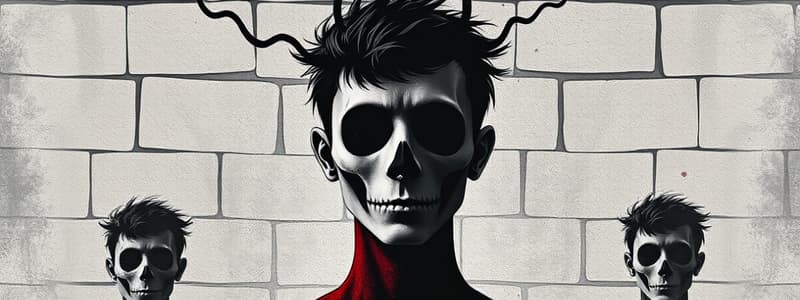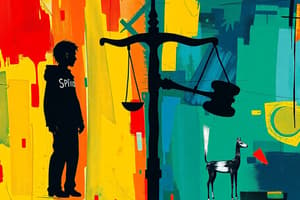Podcast
Questions and Answers
Which of the following penalties corresponds to less grave felonies?
Which of the following penalties corresponds to less grave felonies?
- Reclusion perpetua
- Prision mayor
- Arresto menor
- Prision correccional (correct)
What is the maximum penalty amount for light felonies?
What is the maximum penalty amount for light felonies?
- Exactly 40,000 pesos
- More than 1,200,000 pesos
- Between 40,000 and 1,200,000 pesos
- Less than 40,000 pesos (correct)
An example of an acquisitive crime is:
An example of an acquisitive crime is:
- Homicide
- Malicious mischief
- Robbery (correct)
- Arson
Which type of crime is committed only when the situation is conducive?
Which type of crime is committed only when the situation is conducive?
Which definition best describes an episodial crime?
Which definition best describes an episodial crime?
What type of crime is defined as committed in full possession of sanity?
What type of crime is defined as committed in full possession of sanity?
Which type of crime is generally associated with upper socio-economic individuals?
Which type of crime is generally associated with upper socio-economic individuals?
What is the term used for the killing of a parent, spouse, or child?
What is the term used for the killing of a parent, spouse, or child?
What is the main focus of criminology as a field of study?
What is the main focus of criminology as a field of study?
Why do some scholars argue that criminology is not a science?
Why do some scholars argue that criminology is not a science?
Who coined the term 'criminologia'?
Who coined the term 'criminologia'?
What aspect does not align with the nature of criminology?
What aspect does not align with the nature of criminology?
Which statement is true regarding the scope of criminology?
Which statement is true regarding the scope of criminology?
Which of the following is a component of criminal demography?
Which of the following is a component of criminal demography?
What defines a criminologist according to the relevant regulations?
What defines a criminologist according to the relevant regulations?
Which of the following best describes the term 'criminal ecology'?
Which of the following best describes the term 'criminal ecology'?
What term describes the act of killing one's own brother?
What term describes the act of killing one's own brother?
Which type of homicide involves killing an infant less than 3 days old?
Which type of homicide involves killing an infant less than 3 days old?
What is the definition of eldercide?
What is the definition of eldercide?
Which term refers to the killing of a king?
Which term refers to the killing of a king?
What distinguishes mass murder from serial murder?
What distinguishes mass murder from serial murder?
What is matricide?
What is matricide?
Which term is used for the act of murder committed by one’s own spouse?
Which term is used for the act of murder committed by one’s own spouse?
What defines a criminal in the legal sense?
What defines a criminal in the legal sense?
What aspect of personality does the id govern according to Freud's theory?
What aspect of personality does the id govern according to Freud's theory?
According to Freud, what causes delinquent and criminal behavior?
According to Freud, what causes delinquent and criminal behavior?
What is a fundamental belief of David Emile Durkheim regarding crime?
What is a fundamental belief of David Emile Durkheim regarding crime?
What governs the actions of the ego in Freud's personality structure?
What governs the actions of the ego in Freud's personality structure?
In Gabriel Tarde's theory, what drives individuals to imitate others?
In Gabriel Tarde's theory, what drives individuals to imitate others?
How does the superego influence an individual's behavior?
How does the superego influence an individual's behavior?
What does Freud believe individuals carry with them that influences their future relationships?
What does Freud believe individuals carry with them that influences their future relationships?
What was a critical observation made by Durkheim regarding crime and society?
What was a critical observation made by Durkheim regarding crime and society?
Who is known as the 'Father of Criminology'?
Who is known as the 'Father of Criminology'?
Which principle states that individuals will make logical decisions that maximize their benefits?
Which principle states that individuals will make logical decisions that maximize their benefits?
What does Bentham's principle of 'celebrity of punishment' refer to?
What does Bentham's principle of 'celebrity of punishment' refer to?
In which theory is the concept of 'felicific calculus' found?
In which theory is the concept of 'felicific calculus' found?
Which theory proposes that free will may be affected by external factors?
Which theory proposes that free will may be affected by external factors?
Which of the following concepts is not associated with Cesare Lombroso's theories?
Which of the following concepts is not associated with Cesare Lombroso's theories?
What aspect is considered the most important in the certainty of punishment according to Bentham?
What aspect is considered the most important in the certainty of punishment according to Bentham?
Which of the following individuals is known for introducing the biological perspective in criminology?
Which of the following individuals is known for introducing the biological perspective in criminology?
Flashcards are hidden until you start studying
Study Notes
What is Criminology?
- Comprehensive knowledge concerning crime as a social phenomenon.
- Encompasses law-making, law-breaking, and societal responses to crime.
- Sir Edwin Hardin Sutherland introduced the international definition and is considered the dean of modern criminology.
- Examines crimes, criminals, and societal efforts to manage crime.
- The scientific study of crime causes in relation to individuals and society.
Is Criminology a Science?
- Edwin Sutherland and Donald Cressey: Criminology is not yet a science, but aspires to be.
- George Wilker argues against it being a science due to behavior variations.
- Republic Act (RA) 11131 defines criminology as a regulated profession in the Philippines and acknowledges its scientific aspects.
Evolution of the Term "Criminology"
- "Criminologia" was coined in 1885 by Italian law professor Raffelle Garofalo.
- "Criminologie" was introduced in 1887 by French anthropologist Paul Topinard.
What is a Criminologist?
- Criminologists develop and test theories explaining crime occurrence through observed behavior.
- Defined as individuals with a criminology degree who pass an examination and are registered by the Board.
Nature of Criminology
- Social Science: Crime as a societal creation, existing within social contexts.
- Applied Science: Utilizes different scientific methods.
- Nationalistic: Studies must relate to existing criminal laws of a specific country.
- Dynamic: Criminology evolves with changing social conditions.
Scope of Criminology
- Studies factors influencing criminal behavior development:
- Criminal Demography: Examines the link between crime and population dynamics.
- Criminal Epidemiology: Investigates the relationship between environment and crime.
- Criminal Ecology: Focuses on crime's spatial distribution within communities.
Classifications of Crimes
- Acquisitive Crimes: Offenders gain something (e.g., theft, robbery).
- Extinctive Crimes: Acts leading to destruction (e.g., arson).
- Seasonal Crimes: Occur during specific times of the year.
- Situational Crimes: Happen when circumstances allow.
- Instant Crimes: Committed quickly.
- Episodical Crimes: Occur over a long period.
Types of Criminal Offenders
- White Collar Crimes: Committed by upper socio-economic classes.
- Blue Collar Crimes: Involved ordinary criminals in their livelihoods.
Specific Types of Crimes
- Homicide: Killing of another person.
- Parricide: Killing close family (parents, spouse, children).
- Infanticide: Killing an infant under three days old.
- Various forms of murder with specific categorizations (e.g., matricide, fratricide).
Criminal Classifications
- Acute Criminals: Impulsive, act on passion or anger.
- Chronic Criminals: Repeat offenders driven by deliberation:
- Neurotic Criminals: Result from internal conflict.
- Normal Criminals: Function similarly to typical individuals, but identify with criminal patterns.
Theories in Criminology
- Classical Theory: Proposed by Cesare Beccaria, emphasizing free will in crime.
- Rational Choice Theory: Suggests that individuals make logical decisions for maximum satisfaction.
- Utilitarian Ethical Theory: Jeremy Bentham argues that greatest happiness justifies actions and decisions.
- Neo-Classical Theory: Modifies free will theory, accounting for external influencing factors.
- Italian School (Positive School): Focus on biological, psychological, and sociological determinants of crime.
Historical Contributors
- Cesare Lombroso: Father of criminal anthropology, introduced empirical methods to study crime (discredited ideas).
- Sigmund Freud: Proposed that early emotional experiences significantly impact later behavior through the concepts of Id, Ego, and Superego.
- David Emil Durkheim: Viewed crime as a normal aspect of society; it arises from human differences and social organization.
- Gabriel Tarde: Introduced the Theory of Imitation, highlighting how social interactions influence criminal behavior.
Studying That Suits You
Use AI to generate personalized quizzes and flashcards to suit your learning preferences.




